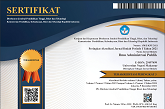Financial Management of Educational Operational Assistance in Improving the Quality of Education in Sesayap District, Tana Tidung Regency
(1) Public Administration, Universitas Terbuka
(2) Public Administration, Universitas Terbuka
(3) Public Administration, Universitas Terbuka
(*) Corresponding Author
DOI: https://doi.org/10.26858/jiap.v13i1.43723
Abstract
Financial management of educational operational assistance (BOP) is school operational assistance originating from the Regional Government of Tana Tidung Regency which is used for school operational activities. The aims of this study are 1) to find out the financial management of educational operational assistance (BOP) to improve the quality of education in Sesayap District, Tana Tidung Regency; 2) to find out the inhibiting factors for operational assistance financial management (BOP) in Sesayap District, Tana Tidung Regency. The informants in this study were the Head of the Education Office, the Head of the Finance Subdivision of the Education Office, and the Principal of a school in Sesayap District, as well as one of the treasurers of the BOP. The research design used is qualitative with a case study approach. Data collection techniques used are interviews, observation, and documentation. The data analysis techniques are data reduction, data presentation, and drawing conclusions. The results of the study show that 1) financial management of operational assistance (BOP) in improving the quality of education in Sesayap District, Tana Tidung Regency has been carried out in accordance with the provisions of 8 educational standards, namely graduate competency standards, content standards, process standards, assessment standards, educator and staff standards education, infrastructure standards, management standards, and financing standards analyzed from research indicators, namely fulfillment of financial obligations, honesty, control, responsibility, efficiency, and effectiveness; 2) the inhibiting factors in BOP financial management are delays in the disbursement of BOP from the district and the lack of awareness of financial responsibility from the organizers of activities or programs to the BOP treasurer of educational units.
Full Text:
PDFReferences
Amerieska, S. (2015). Pengembangan Model Akuntabilitas Pengelolaan Keuangan dan Aset Desa Berbasis Shariate Enterprise Theory.
Arhas, S. H., Suprianto, S., Saleh, S., Niswaty, R., & Jamaluddin, J. (2022). Analysis of Student Morality and Learning Achievement at Universitas Negeri Makassar. 1st World Conference on Social and Humanities Research (W-SHARE 2021), 320–324.
Baxter, P., & Jack, S. (2008). Qualitative Case Study Methodology: Study Design and Implementation for Novice Researchers e Qualitative Report, 13 (4), 544-559. Retrieved from hEp. Nsuworks. Nova. Edu/Tqr/Vol13/Iss4/2.
Devas, N. (2009). Keuangan Pemerintah Daerah di Indonesia. Penerbit Gramedia Pustaka Utama.
Dodopo, Y., Sondakh, J., & Tinangon, J. (2017). Pengaruh komitmen organisasi, pengendalian intern akuntansi, peran internal audit, pendidikan, dan kualitas pelatihan terhadap keterandalan laporan keuangan pada SKPD Pemerintah Kabupaten Halmahera Utara. JURNAL RISET AKUNTANSI DAN AUDITING" GOODWILL", 8(1).
Harsono, D. (2007). Pengelolaan Pembiayaan Pendidikan. Sleman: Pustaka Book.
Humaira, I., & Sagoro, E. M. (2018). Pengaruh pengetahuan keuangan, sikap keuangan, dan kepribadian terhadap perilaku manajemen keuangan pada pelaku UMKM sentra kerajinan batik KABUPATEN BANTUL. Nominal: Barometer Riset Akuntansi Dan Manajemen, 7(1), 96–110.
Idoch, M. (2016). Administrsi Pendidikan Dan Manajemen Biaya Pendidikan.
Jatmiko, D. P. (2017). Pengantar Manajemen Keuangan: Diandra Kreatif. Diandra Kreatif.
Kasmir, S. E. (2016). Aanalisis laporan keuangan. Rajawali Pers.
Lubis, A. (2013). Pelaksanaan Standar Nasional dalam Dunia Pendidikan. -.
Martini, R., Lianto, N., Hartati, S., Zulkifli, Z., & Widyastuti, E. (2019). Sistem Pengendalian Intern Pemerintah atas Akuntabilitas Pengelolaan Keuangan Dana Desa di Kecamatan Sembawa. Jurnal Akademi Akuntansi, 2(1).
Miles, M. B., & Huberman, A. M. (1994). Data management and analysis methods. Sage Publications, Inc.
Mustofa, A. I. (2012). Pengaruh penyajian dan aksesibilitas laporan keuangan terhadap akuntabilitas pengelolaan keuangan Kabupaten Pemalang. Accounting Analysis Journal, 1(1).
Permendikbud. (2018). Nomor 33 tentang Standar Teknis Pelayanan Minimal Pendidikan.
Rekasari, M. H. (2020). Efektivitas Pengelolaan Keuangan Sekolah (Study Evaluativ Di SMA Negeri 7 Bengkulu Selatan). MANAJER PENDIDIKAN, 14(2), 83–91.
Saleh, S., Marsina, A., Darwis, M., Jamaluddin, J., Arhas, S. H., Nasrullah, M., & Akib, H. (2021). The Influence of Contextual Learning Approach on Student’s Learning Motivation Competence of Automation Skills and Office Governance. Proceedings International Education Webinar of IAIN Palopo (PROCEEDINGS IEWIP), 1(1), 141–152.
Santoso, E. (2011). Efisiensi dan efektivitas pengelolaan keuangan daerah di kabupaten ngawi.
Silvy, M., & Yulianti, N. (2013). Sikap pengelola keuangan dan perilaku perencanaan investasi keluarga di Surabaya. Journal of Business and Banking, 3(1), 57–68.
Suciani, N. M., & I Wayan, D. (2019). Peta Mutu Pendidikan di Bali Jenjang SMA Provinsi Bali (Diolah dan dianalisis berdasarkan data Rapor Mutu Tahun 2018). LPMP BALI.
Sugiyono. (2011). Metodologi penelitian kuantitatif kualitatif dan R&D. Alpabeta, Bandung.
Sugiyono, S. (2009). Metode Penelitian Kuantitatif, Kualitatif dan R&D, Cetakan 8. Alfabeta, Bandung.
Sultan, S. (2014). Kebijakan Pengelolaan Keuangan Daerah dan Akuntabilitas Penggunaan Anggaran. Academica, 6(1).
Suprianto, S., Sirait, E. J. M., & Arhas, S. H. (2021). The Influence of Classroom Management on Students’ Learning Motivation in the Department of Office Administration. Jurnal Office, 7(1), 159–168.
Utama, D. A., & Setiyani, R. (2014). Pengaruh Transparansi, Akuntabilitas, Dan Responsibilitas Pengelolaan Keuangan Sekolah Terhadap Kinerja Guru. Dinamika Pendidikan, 9(2).
UU No 20 Tahun. (2003). Undang-Undang Nomor 20 Tahun 2003 Tentang Sistem Pendidikan Nasional. 6–8. https://doi.org/10.16309/j.cnki.issn.1007-1776.2003.03.004
Article Metrics
Abstract view : 158 times | PDF view : 57 timesRefbacks
- There are currently no refbacks.
Copyright (c) 2023 Muhammad Noor Huda, Rahmat Hidayat, Titi Chandrawati

This work is licensed under a Creative Commons Attribution 4.0 International License.
Diterbitkan oleh:
Program Studi Ilmu Administrasi Publik
Program Pascasarjana Universitas Negeri Makassar
JIAP Index By:

This work is licensed under a Creative Commons Attribution 4.0 International License.









